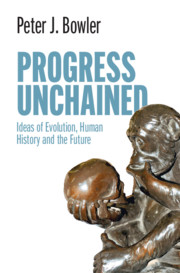Book contents
- Progress Unchained
- Progress Unchained
- Copyright page
- Contents
- Figures
- Preface
- 1 Introduction
- Part I The Ladder of Progress and the End of History
- 2 From the Chain of Being to the Ladder of Creation
- 3 The Hierarchy of Humanity
- 4 Progress to Paradise
- 5 Ascent to Utopia
- 6 End of an Era?
- Part II Towards a World of Unlimited Possibilities
- Bibliography
- Index
4 - Progress to Paradise
Christianity, Idealism and History
from Part I - The Ladder of Progress and the End of History
Published online by Cambridge University Press: 11 February 2021
- Progress Unchained
- Progress Unchained
- Copyright page
- Contents
- Figures
- Preface
- 1 Introduction
- Part I The Ladder of Progress and the End of History
- 2 From the Chain of Being to the Ladder of Creation
- 3 The Hierarchy of Humanity
- 4 Progress to Paradise
- 5 Ascent to Utopia
- 6 End of an Era?
- Part II Towards a World of Unlimited Possibilities
- Bibliography
- Index
Summary
Historians have recognized parallels between the temporalized chain of being and early ideas about human progress, both being seen as the ascent of a linear scale of development towards a predetermined goal. But the sequence of developmental stages postulated by social thinkers could be defined in different ways depending on whether the goal was a spiritual one (paradise) or a more utilitarian vision of a perfectly ordered society guaranteeing happiness for all (utopia). This chapter outlines the emergence of the more spiritual approach, noting its origins in Christian millenarianism and the hope that Christ's message would eventually lead humanity to regain the state of perfection it enjoyed before the Fall. Eighteenth-century advocates of social progress such as Joseph Priestley saw it as a process of spiritual evolution, a view developed further by liberal Christian thinkers in the following century. Idealist philosophers such as Hegel also defined history in terms of humanity's ascent of a spiritual scale, although their later followers over-simplified the message. There were speculations about the nature of the future society which would give full rein to our spiritual nature.
Keywords
- Type
- Chapter
- Information
- Progress UnchainedIdeas of Evolution, Human History and the Future, pp. 89 - 118Publisher: Cambridge University PressPrint publication year: 2021

